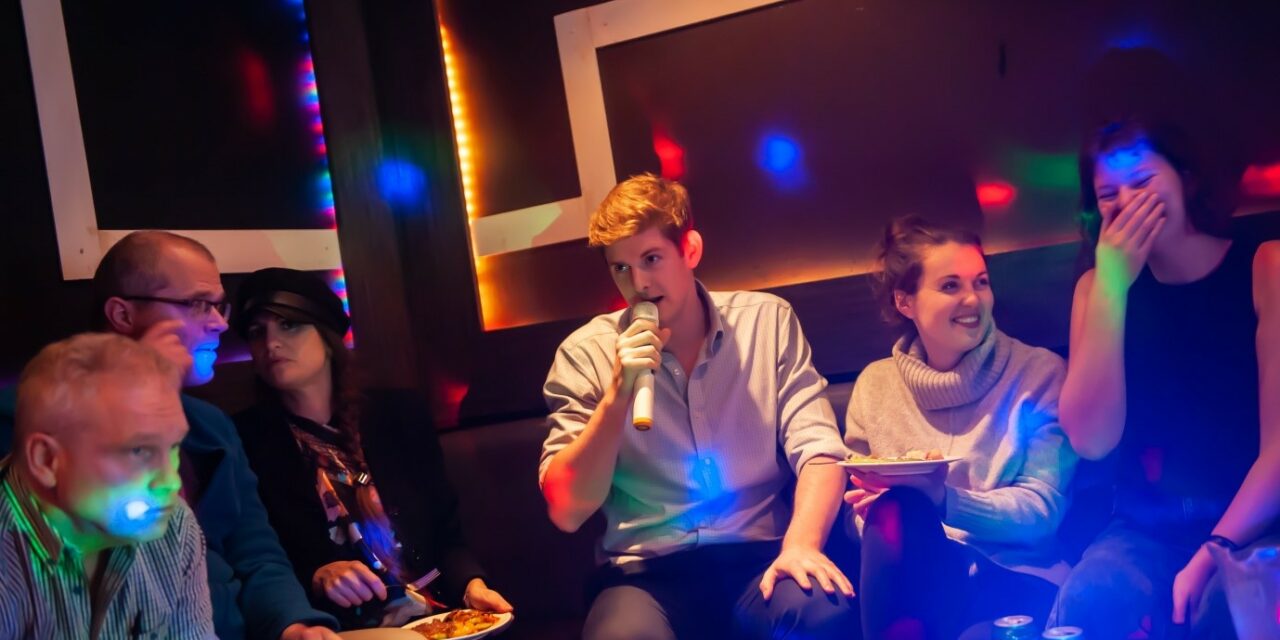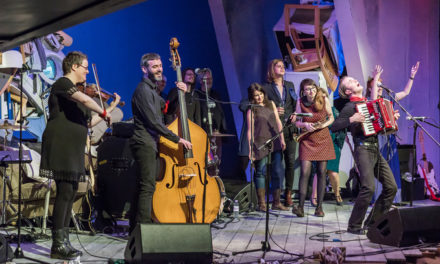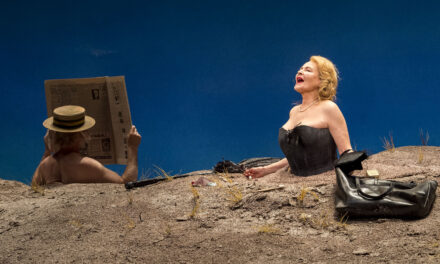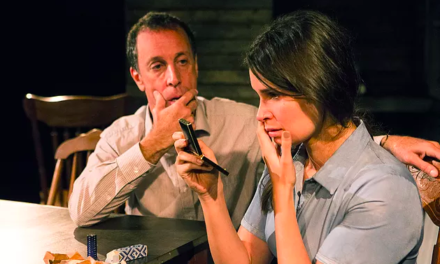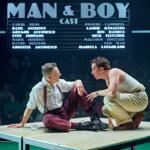Turbo bubble-tea brewing, participative economic discussions, and live, squirting orgasms were seen at Lucky Ping Pong Dragon Karaoke in London’s Covent Garden, in what was probably amongst the most experimental productions of the CAN Festival 2019.
Packed with a variety of short performances, Lucky Ping Pong Dragon Karaoke was not what one usually expects of a show, even a multimedia one, and it bravely trekked the fine line between entertainment and self-indulgence without stopping to apologize on the way. The company Gasp-C is a pan-Chinese performance group theatre artists from China; some are current Ph.D. students and others are professional theatre-makers. They make their own work in the UK but come together with a collective intention to challenge and play with the representation of “Chineseness.”
The show happened in the intimate space of a karaoke bar in London’s Chinatown. Echoing the setting, a menu of eight performances created by the cast of four Chinese performers was also available for the audience to choose from. Because of time limits, only five pieces could be performed. Whoever first shouted out the name of the next performance would determine what everyone saw. The British with their naturally shy character might have found this selection process a disadvantage – the show program was eventually determined mainly by two or three of the most outspoken in the room. However, this might be less the case if the host adjusted to the culture gap between audience members and encouraged the shyer ones to speak up for themselves.
Each of the shows was just 10 minutes long and expressed the artists’ reflections on cultural identity, consumption, and objectification. Though the performers supported one another and helped expand each other’s performances, each segment was almost entirely designed, developed and performed by one individual. As a result, each performance seemed to begin with a process of adjusting to the wildly different styles. Although this was not necessarily a bad thing, it seemed that the artists had really limited time and space in which to explore their themes in depth. Some shows were entertaining and engaging; others were more confusing because of this limitation. On the other hand, it seemed that it was not part of the creators’ purpose to make well-structured, strong political arguments; the shows usually stopped at the level of entertainment and presented the realities of cultural conflict in a caricatured way.
Zhiyue Hu opened the show with AN ABSOLUTELY FOOL-PROOF GUIDE TO AUTHENTIC CHINESE CULTURE (New Year Ver) – a comedic presentation in which she stretched Western stereotypes about and misconceptions of the Far East into an absurd lecture on what makes an authentic Chinese. She wore a Peking opera costume and delivered the lecture with eccentric politeness, befitting what many Westerners might presume of a Chinese character. Although the show’s intention was to ridicule Westerners’ stereotypical views of the Chinese, the text didn’t work well for the Western audience members, many of whom fell into silent confusion about what the jokes referred to, while the more knowledgeable Chinese roared with laughter. Her other show, UNTITLED #52619387 (DARLING I MIXED YOU), was a live version of otomad, a type of music video endemic today in East Asian countries, with its obsessive looping of phrases. In front of a screen showing an otomad video mixed with video footage of her own academic and professional performance experiences, Zhiyue kept repeating simple dance steps to the obsessive rhythm. I think the show could have been more interesting, however, if she had discarded the video at one point and created an otomad solely from live performance.

An Absolutely Fool-Proof Guide To Authentic Chinese Culture (Chinese New Year Ver.). Photo copyright Nadjet Ben Maghnia.
All the other pieces included some level of audience participation, though the experience varied. Burong’s DOUBLE EXPLOITATION involved audience watching a live sexual display that emulated pornographic entertainment not two meters away. However, the prolonged orgasm of a female body became more and more disturbing and even disgusting to witness. Maybe it was designed to make audience members feel repulsed by the porn industry that often exploits immigrants. However, the show failed to create a clear focus for the audience when the audio, wordy PowerPoint decks and live performance were all delivering unrelated narratives at the same time. Eventually, the live performance of the porn actress took over the space. But as an audience member who already opposes the exploitative elements of the porn industry, I felt forced to watch a show that provokes unnecessary suffering.

Double Exploitation. Photo copyright Nadjet Ben Maghnia.
In comparison, Mengting Zhuo’s QIAN(MONEY) and Howl Yuan’s GENERAL WEST: THE BATTLE OF BUBBLE TEA put audiences in a more enjoyable position. The former paid audience members who ordered the show £1/minute for a teasing conversation on the subject of value. The conversation was sprinkled with economic theories and captivated the audience with its insight and light humor. Again, no conclusion was reached or intended, and it seemed that there was no central question about money being raised. GENERAL WEST featured an over-the-top Eastern character who vows to destroy certain icons of Western influence. His aggressiveness became most comedic when he began to make bubble tea in a frantic manner and invited the audience to taste it with extreme enthusiasm. Yet many of the jokes during the performance had a special appeal for Eastern audience members, who knew well the experiences and influences he was referring to.

West Or Waste: Rise From The East. Photo copyright Nadjet Ben Maghnia
As the final show ended, the performers gathered to thank us for our attendance and treated us to a final dance choreographed to Aaron Kwok Fu Shing’s Loving You Endlessly – a song that pretty much has become a popular meme in China over the years. Then the audience was free to order more songs and spend time chatting. The evening ended with everyone singing and dancing together spontaneously, a lighthearted connection amongst strangers.
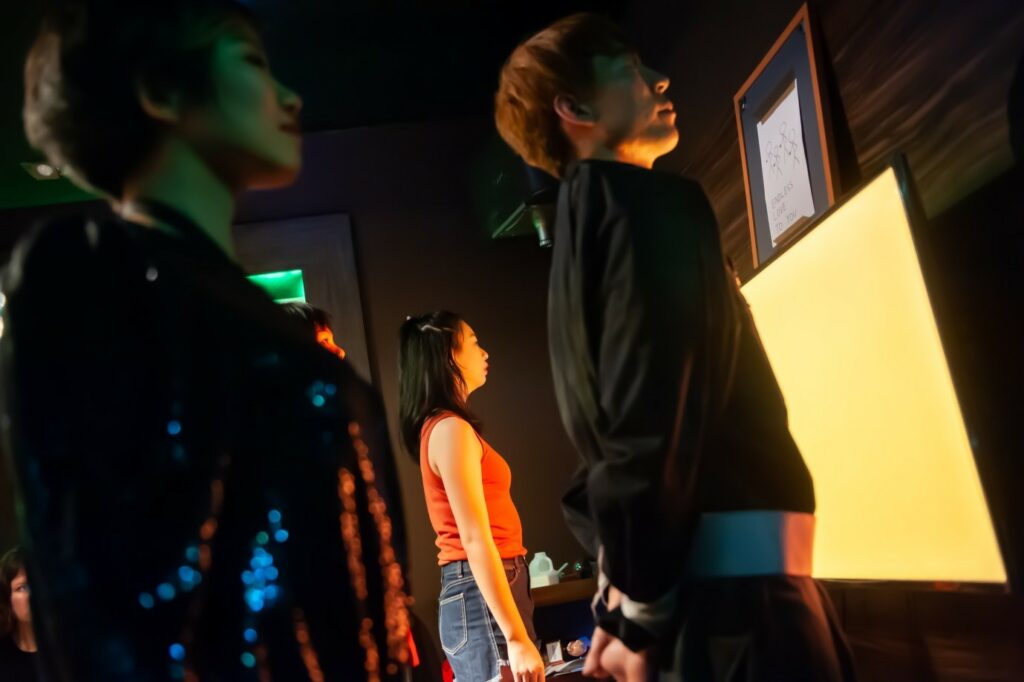
Ending song. Photo copyright Lidia Crisafulli.
Lucky Ping Pong Dragon Karaoke, with all its obnoxiousness and experimentation, had us at times roaring with laughter, genuinely engaged, and craving to see more. It felt less like a serious theatre performance than like a party where the cast members enjoy sharing their jokes and cultural experiences and invite us to join in. But I think all the shows need to be further developed in terms of dramaturgy. Many of the pieces had things that worked well, and things that didn’t. The main challenge of staging a collection of shows around the subject of the cultural gap between East and West might be making it work for audiences from both sides of the divide. Currently, it worked better for the East Asian audience than for the Europeans. Perhaps in time, the creatives will find a way to bridge the cultural gap, as many in both our societies try to as well.
Cast: Burong Zen, Howl Yuan, Mengting Zhuo, Zhiyue Hu
This post was written by the author in their personal capacity.The opinions expressed in this article are the author’s own and do not reflect the view of The Theatre Times, their staff or collaborators.
This post was written by Ian Zarate and Haylin Cai.
The views expressed here belong to the author and do not necessarily reflect our views and opinions.

